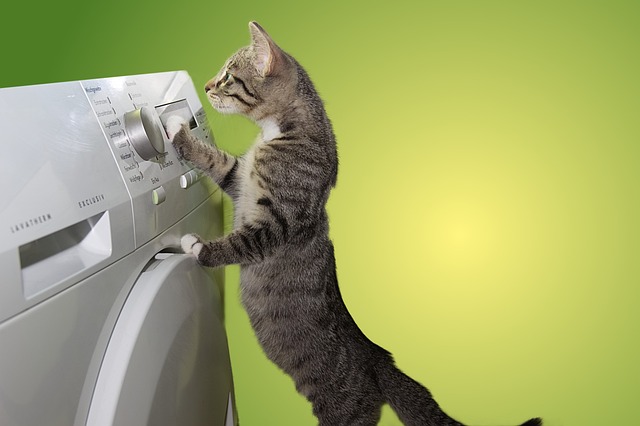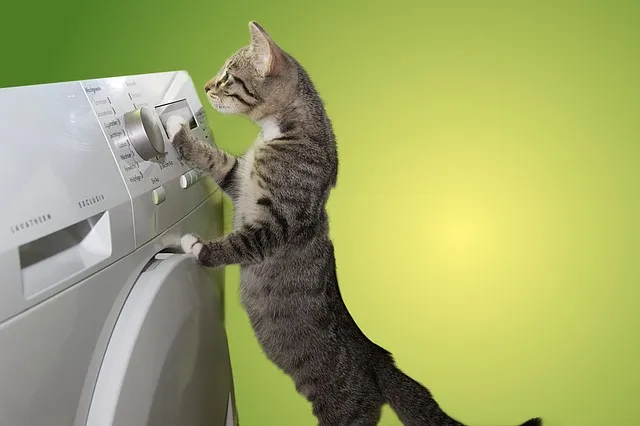What’s the Impact of Dryer Age on Its Energy Consumption?
Let’s break it down. Older dryers, those that have seen more cycles than a washing machine on spin cycle, tend to work less efficiently. Why? Well, over the years, parts like the heating element and the motor can wear out or become less effective. This means your dryer has to work harder and longer to get your clothes dry, which naturally translates into higher energy bills.
Think of it this way: when your dryer is new, it’s like a sprinter at the starting line, fresh and full of energy. But as it ages, it’s more like a runner who’s been in the race for a while, slowing down and using more energy to keep going. The result? You’re paying more for each load of laundry.
Also, let’s not forget about advancements in technology. Newer dryers are designed with energy efficiency in mind. They come equipped with features like moisture sensors that can detect when clothes are dry and shut off automatically, which prevents unnecessary energy use. Older models, however, might just keep running until you manually turn them off, which wastes energy and money.
So, if your dryer is showing its age, it might be time to consider a replacement. Investing in a newer, more efficient model could save you more than just a few bucks on your electricity bill—it might also give your laundry routine a much-needed upgrade.
How Old Is Too Old? The Surprising Energy Costs of Aging Dryers
As dryers age, they become less efficient, and that inefficiency can hit you right in the wallet. Older models are typically less adept at using energy efficiently compared to their modern counterparts. Imagine your dryer as a car with an old engine; it works, but it guzzles gas like there’s no tomorrow. Similarly, an aging dryer can consume significantly more energy to get the job done.
How old is too old? Well, most dryers start to show their age around the 10-year mark. If your dryer is pushing 15 years or more, it’s probably time to start thinking about a replacement. Older dryers often lack the advanced features found in newer models, such as moisture sensors that help prevent over-drying and energy-saving settings that reduce consumption.
Consider this: upgrading to a newer, more efficient model might seem like a big investment initially, but it can lead to substantial savings over time. Just like swapping that old gas-guzzler for a hybrid car, a new dryer can cut your energy costs significantly. Plus, modern dryers often come with better warranties and advanced technology that not only saves energy but also improves drying performance.
So, if your dryer is approaching or surpassing the decade mark, it might be worth evaluating whether its energy costs are getting too high. Sometimes, investing in a new appliance can be the smartest move for both your wallet and the environment.
Energy Bills Rising? It Might Be Your Dryer’s Age to Blame
Imagine your dryer as an old, worn-out car that’s struggling to keep up with modern standards. Just like a vintage vehicle might guzzle gas and require constant repairs, an aging dryer can consume more electricity than necessary, leading to inflated energy bills. As appliances age, their efficiency tends to drop. Parts can become less effective, and what was once a smooth operation now becomes a drain on your power resources.
Newer dryers are designed with advanced technology that minimizes energy use while delivering the same drying power. Think of them as high-tech vehicles with fuel-efficient engines. These modern models often come equipped with energy-saving features like moisture sensors that automatically shut off the dryer when clothes are dry, preventing wasted energy.
On the other hand, an old dryer can be like a leaking faucet—slowly but steadily wasting resources. The wear and tear on older machines mean they may run longer to get the job done, and often, they don’t have the same energy-saving features found in newer models. This means you’re paying more for each load of laundry, simply because your dryer is less efficient.
So, if your energy bills are climbing, it might be time to consider the age of your dryer. Investing in a newer, more energy-efficient model could be just the solution you need to cut costs and keep those bills in check.
From New to Old: Tracking the Energy Efficiency of Your Dryer Over Time

Start by noting the basics: the age of your dryer and how often you use it. A new dryer is usually at its peak, but as it racks up the hours, it can start to lose its edge. Regularly check its performance by tracking the drying times. If you notice it taking longer to dry clothes, that’s a sign it might be becoming less efficient. Also, listen for unusual noises; they can indicate worn-out parts.
Energy bills are another clue. If you see a steady rise in your electricity costs, it could mean your dryer isn’t running as efficiently as it used to. A simple fix might be cleaning the lint filter or checking for any blockages in the vents. These small maintenance tasks can make a big difference.
Don’t forget about the power rating. Modern dryers are designed to be more energy-efficient, so if your dryer is old, it might be worth considering an upgrade. Newer models often come with features that save energy, like moisture sensors that stop the cycle when clothes are dry.
In essence, tracking your dryer’s efficiency involves a bit of detective work. Regular maintenance, paying attention to performance changes, and keeping an eye on your utility bills can help you gauge whether your dryer is staying in shape or if it’s time for a change.
Is Your Dryer Aging You Out of House and Home? The Hidden Costs of Old Appliances
Think about it—newer models are designed with advanced technology that optimizes energy use and minimizes drying time. If your dryer is a relic from the past, it might be using outdated technology that guzzles power. Imagine driving a car that’s miles behind in fuel efficiency; that’s essentially what an old dryer is doing to your electricity bills.
But it’s not just about the extra cash you’re spending on electricity. Old dryers are more prone to breakdowns. A sudden repair can mean unexpected costs and inconvenient downtime. Ever had to scramble for a laundromat because your dryer gave up the ghost? It’s not only annoying but can also add up in expenses.
Plus, let’s talk about wear and tear. Older dryers can be tough on your clothes, causing them to wear out faster. Think of it as your dryer giving your favorite jeans a rough workout. Newer models are gentler and designed to protect your wardrobe, extending the lifespan of your clothing.
So, is your dryer aging you out of house and home? If your appliance is older, it might be time to consider a replacement. Investing in a new dryer could save you money in the long run, make laundry day less of a hassle, and keep your clothes in better shape.
The Impact of Dryer Age on Energy Consumption: What You Need to Know
Imagine your dryer as a hardworking athlete. When it’s brand new, it’s like a sprinter at the top of its game—efficient, fast, and powerful. However, as it gets older, it’s more like a marathon runner who’s seen better days, slowing down and working harder just to keep up. An older dryer can take significantly longer to dry your clothes, which translates directly into higher energy usage. This inefficiency isn’t just a minor inconvenience; it can lead to a noticeable increase in your energy bills.
Here’s why: as dryers age, their components wear out and become less efficient. For instance, heating elements can become less effective over time, making the dryer use more energy to achieve the same results. Additionally, the lint filter and vent systems can become clogged or less effective, forcing your dryer to run longer cycles to get your clothes dry.
Think of it this way: if you’re cooking a meal with an old, worn-out stove, you’d need to crank up the heat or cook for a lot longer to get the same results you would with a new, energy-efficient model. The same principle applies to your dryer. An old dryer works harder and longer, consuming more electricity in the process.

Regular maintenance can help extend your dryer’s life, but eventually, upgrading to a new, energy-efficient model can save you a substantial amount on your energy bills. So, if your dryer is reaching the end of its lifespan, it might be worth considering an upgrade for both your budget and the environment.
Old Dryers, High Costs: How Aging Appliances Are Driving Up Your Energy Bills
Think of it this way: an old dryer is like a vintage car that runs on a lot more fuel than a modern model. Over time, dryers lose efficiency. They take longer to dry clothes, and they use more energy to get the job done. So, if your dryer is more than 10 years old, it’s likely operating at a fraction of its original efficiency, and those extra minutes running can add up.
Older dryers often have outdated technology, which means they aren’t as adept at regulating heat or airflow as their newer counterparts. Imagine trying to cook a meal with an ancient oven—it’s slow, uneven, and uses more electricity. Similarly, an outdated dryer can lead to longer drying cycles and increased energy use.
Plus, let’s not forget about maintenance. As dryers age, they may develop issues like clogged vents or malfunctioning thermostats. These problems can force your appliance to work harder, further driving up your energy consumption. It’s like trying to run a marathon with a sprained ankle—everything becomes much more difficult and exhausting.
If you’re constantly shelling out extra cash for your energy bills, it might be time to consider an upgrade. Newer dryers are designed to be much more energy-efficient and come with advanced features that save both time and money. By investing in a new appliance, you could cut your energy costs and enjoy faster, more efficient drying—making your wallet and your laundry day a whole lot happier.
How the Age of Your Dryer Affects Your Energy Usage: A Comprehensive Guide
Older dryers, often 10 years or more in service, are notorious for their energy inefficiency. They struggle to reach and maintain the temperatures they once did effortlessly. This means they work harder and longer to dry your clothes, consuming more electricity in the process. It’s like asking a vintage car to compete in a modern race—it’s just not built for it anymore.
Newer dryers, on the other hand, are designed with cutting-edge technology that optimizes energy use. They feature advanced sensors and improved heating elements that adjust according to the load size and moisture levels. This means they use only the energy necessary to get your clothes dry, unlike older models that run until they’ve guessed correctly about dryness.
If you’re seeing a spike in your energy bills, it might be worth evaluating the age and efficiency of your dryer. Upgrading to a newer model could save you a significant amount on your energy costs. Think of it as investing in a more fuel-efficient car: the upfront cost might sting a bit, but the long-term savings and environmental benefits are well worth it.
So, before you shrug off those rising bills, take a look at your dryer. It might be time for an upgrade to keep both your clothes and your wallet in top shape.

